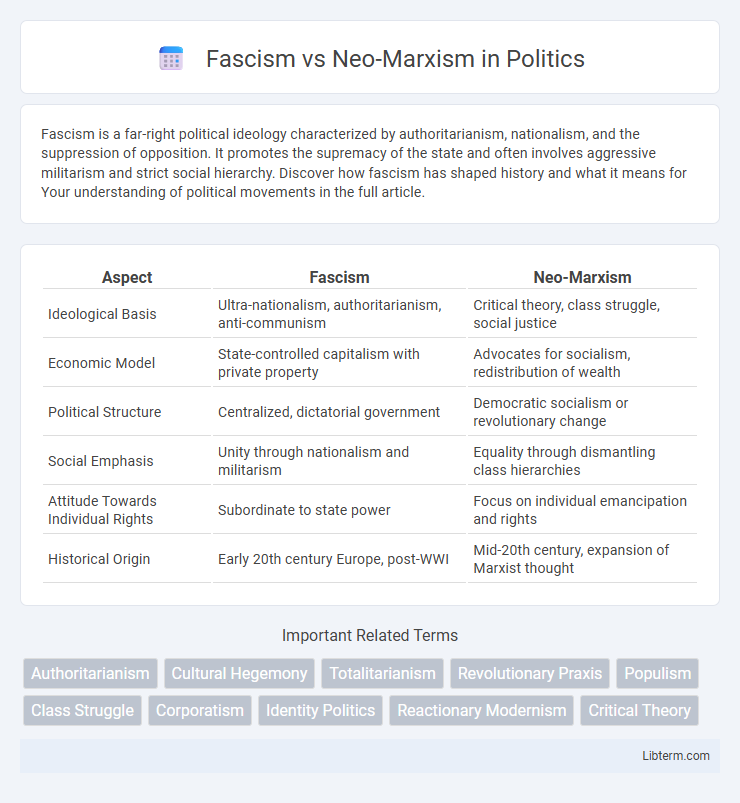Fascism is a far-right political ideology characterized by authoritarianism, nationalism, and the suppression of opposition. It promotes the supremacy of the state and often involves aggressive militarism and strict social hierarchy. Discover how fascism has shaped history and what it means for Your understanding of political movements in the full article.
Table of Comparison
| Aspect | Fascism | Neo-Marxism |
|---|---|---|
| Ideological Basis | Ultra-nationalism, authoritarianism, anti-communism | Critical theory, class struggle, social justice |
| Economic Model | State-controlled capitalism with private property | Advocates for socialism, redistribution of wealth |
| Political Structure | Centralized, dictatorial government | Democratic socialism or revolutionary change |
| Social Emphasis | Unity through nationalism and militarism | Equality through dismantling class hierarchies |
| Attitude Towards Individual Rights | Subordinate to state power | Focus on individual emancipation and rights |
| Historical Origin | Early 20th century Europe, post-WWI | Mid-20th century, expansion of Marxist thought |
Understanding Fascism: Core Ideologies
Fascism is characterized by ultra-nationalism, authoritarian power structures, and the suppression of political dissent to maintain state control. It emphasizes a centralized autocratic government led by a dictatorial leader, combined with strong regimentation of society and the economy. Core ideologies include glorification of the nation or race, rejection of liberal democracy, and opposition to Marxist socialism and communism.
Defining Neo-Marxism: Principles and Evolution
Neo-Marxism extends classical Marxist theory by integrating insights from sociology, psychology, and critical theory, emphasizing the role of culture, ideology, and hegemony in maintaining capitalist societies. It critiques both economic structures and superstructures, positing that social change requires addressing cultural and ideological domination alongside economic exploitation. Key figures such as Antonio Gramsci and the Frankfurt School have shaped Neo-Marxism's evolution, focusing on the complex interplay between power, culture, and resistance in modern capitalist contexts.
Historical Origins of Fascism and Neo-Marxism
Fascism originated in early 20th-century Europe, particularly Italy under Benito Mussolini, as a nationalist reaction against liberal democracy, socialism, and communism, emphasizing authoritarianism and state control. Neo-Marxism developed in the mid-20th century, evolving from classical Marxist theory by incorporating critiques of culture, ideology, and capitalism's global structures, influenced by thinkers like Antonio Gramsci and the Frankfurt School. Both ideologies emerged in response to social and economic crises, but while fascism promoted ultranationalism and hierarchical order, Neo-Marxism focused on systemic critiques and revolutionary transformation through cultural and political change.
Key Philosophers and Influencers
Fascism, primarily shaped by Benito Mussolini and intellectuals like Giovanni Gentile, emphasizes authoritarian nationalism and the synthesis of state and corporate power, rejecting liberal democracy and Marxist class struggle. Neo-Marxism, influenced by thinkers such as Antonio Gramsci and the Frankfurt School philosophers Max Horkheimer and Theodor Adorno, expands classical Marxism by incorporating culture, ideology, and critical theory to analyze capitalist societies and power dynamics. These divergent schools of thought reflect contrasting approaches to social order, power, and economic structures, with fascism advocating for centralized control and neo-Marxism critiquing systemic inequalities through cultural and ideological lenses.
Political Strategies and Tactics
Fascism employs authoritarian centralized control, aggressive nationalism, and the suppression of opposition through propaganda and paramilitary forces to consolidate power. Neo-Marxism utilizes critical theory, grassroots mobilization, and ideological critique of capitalism to foster social change and challenge existing power structures. Both ideologies leverage mass movements but differ fundamentally in their approaches: Fascism emphasizes top-down control, while Neo-Marxism promotes bottom-up activism.
Attitudes Toward Individual Rights and Freedoms
Fascism prioritizes state control over individual rights, often suppressing personal freedoms to maintain national unity and authoritarian power. Neo-Marxism advocates for expanding individual rights by addressing economic and social inequalities through collective action and systemic change. While fascism limits freedoms to enforce conformity, Neo-Marxism emphasizes protecting civil liberties to empower marginalized groups.
Economic Theories and Policies Compared
Fascism promotes state-controlled capitalism where private property exists but is subordinated to government interests, emphasizing autarky and national industry protection. Neo-Marxism advocates for the abolition of private property in favor of collective ownership and class struggle to address economic inequalities through redistribution and social welfare policies. While fascist economic policies align with corporatism and cooperation between the state and businesses, neo-Marxism emphasizes dismantling capitalist structures to achieve social equity and worker empowerment.
Social and Cultural Impacts
Fascism enforces rigid societal hierarchies and suppresses cultural diversity, promoting nationalism and conformity while undermining individual freedoms. Neo-Marxism emphasizes class struggle and cultural hegemony, advocating for systemic change to address economic inequality and cultural oppression. Socially, fascism fosters exclusion and authoritarian control, whereas neo-Marxism encourages critical awareness and empowerment of marginalized groups.
Contemporary Relevance and Applications
Fascism and Neo-Marxism present contrasting frameworks influencing contemporary political landscapes, with fascism emphasizing authoritarian nationalism and hierarchical control, while Neo-Marxism critiques capitalism and advocates for social equality through class struggle. Current global movements often reflect fascist tendencies in rising ultra-nationalism and populist authoritarianism, whereas Neo-Marxism informs progressive policies targeting systemic inequalities and economic redistribution. Both ideologies shape debates on governance, social justice, and economic reform, highlighting their enduring impact on political discourse and policy-making.
Critical Debates and Future Trajectories
Critical debates between Fascism and Neo-Marxism center on the role of state power and economic control, with Fascism advocating for authoritarian nationalism and centralized authority, while Neo-Marxism emphasizes class struggle and the transformation of capitalist structures through social justice and equity. Scholars analyze the resurgence of far-right movements alongside progressive social movements, highlighting tensions over identity, globalization, and cultural hegemony. Future trajectories suggest ongoing ideological clashes, with Neo-Marxism adapting to address contemporary capitalist crises and Fascism evolving through populist nationalism and digital propaganda.
Fascism Infographic

 libterm.com
libterm.com